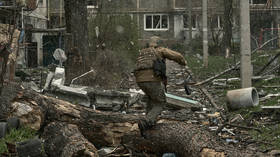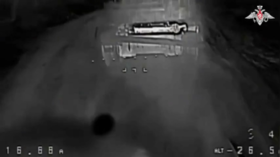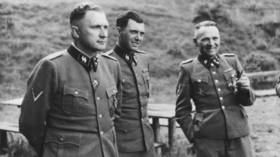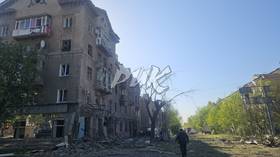‘Strategic anti-ISIS plan’ should involve other powers besides US
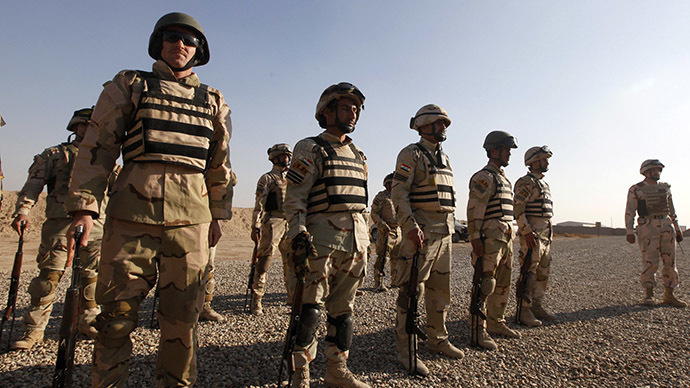
There is no viable strategy against ISIS in Iraq involving just US advisers or even troops on the ground, without a combination of regional and other powers standing united, Lawrence Wilkerson, former chief of staff to US Secretary Colin Powell told RT.
RT:I think it’s fair to say it’s been a decade long disaster in Iraq. Is the latest deployment of 450 advisers really going to help?
Lawrence Wilkerson: I think that is a hugely important question. I personally don’t think that any amount of advisers is going to be able to instil that kind of feeling, nationalist or whatever you want to call it, in the Iraqi military that will give it the kind of steel, the kind of backbone it needs to stand up to ISIS. I hope I'm wrong. I hope that in combination with US air power, and maybe Peshmerga from the Kurdish region and some other forces that are willing to fight – and I include in that Sunnis who might be attracted over to the Iraqi side – that that combination of forces along with the advisers will be able to accomplish the mission. But I must reiterate that it is up to them, it is not up to the US forces on the ground.
RT:This unit specializes in combat rather than training activities, why's that unit been sent?
READ MORE: US considers opening more military hubs in Iraq to fights ISIS
LW: I don't think you are going to see participation in combat other than perhaps an advisory status out with Iraqi front-line troops and Peshmerga and others, maybe even Iranian militias, and advising them and helping them control the air power and put the air power on targets. I don’t think you will actually see them engaged in ground combat.
RT:We are also hearing high ranking officials reportedly saying there are plans for a new base in the country. How does this all fit in with the supposed withdrawal?
LW: I don’t think there is any plan for a phased withdrawal from Iraq. I think what we’re seeing is a gradual, incremental increase in forces in Iraq, both in terms of the power being brought, basically air power against them and the forces that are on the ground. I don’t know where the idea of a withdrawal came from. I don’t think there is any plan on anybody’s sheet of music right now for a withdrawal from Iraq. There is a plan to make the forces in Iraq, principally the Iraqi forces, but also others that are supporting them, have a better chance of defeating the forces that are in Iraq that we identify as ISIS and the Sunnis who don’t come over to the Iraqi side and still fight with ISIS. I don't think there is any plan to withdraw from that any time soon.
RT:Washington recently admitted it doesn’t have a fully worked out strategy for combating the Islamic State in Iraq. Is it part of a longer-term strategy or a knee jerk reaction?
LW: I heard the president say that, and while I might have winced a little when he said it so publicly, I think I understand what he is saying and that is that he has a tactical plan of which some of these 450-odd troops are the latest installment.
READ MORE: ‘US created conditions for ISIS’: RT talks to Iraqi Shia militia as they leave to fight
But he does not really have a strategic plan because a strategic plan, if it is realistic, has to have a lot of other partners in it. Not least of which is Iran and I must say Russia too; Turkey, now that Erdogan has kind of been set back by his loss in the recent elections. These are the people who will need to participate too in bringing stability to the region in the areas where we have instability, principally Afghanistan, Iraq and Syria, but elsewhere if we are going to achieve anything. I cannot overemphasize that fact: You cannot have a workable, viable strategy for the region unless you have these other players, and I say again including Russia, signed up to that strategy and participating therein.
RT:Do you think the US involvement will actually continue to increase until there are boots on the ground or a further US military base in the country, which is something that the White House has denied?
LW: Well I’m very concerned about that. I don’t think that is a productive path to walk down. I don’t think American forces on the ground engaged in combat; despite some people Pentagon's theories to the contrary, is a viable option. I think our presence in Iraq and Afghanistan in the last almost 14 years has proven that.
READ MORE: White House hopes new Iraq base will boost Sunni recruitment
I don’t think American soldiers and marines are going to do the job in that region. Certainly they could go in and kick ISIS’s butt. They could kick them out of Iraq, and possibly kick them out of Syria. But all they are going to be kicking them into are places of hiding and places of sanctuary. They will come right back out as soon as the American forces are gone. And they will really make it messy for the American forces while they are there. So this is an unworkable strategy. It simply has no possibility of succeeding. And I don’t see this president at least, I won't speak for the new president in 2016 whomever he or she may be, but I don’t think this president has any interest in doing that.
RT:We spoke to a couple of experts over the last few days who say the recent deployment is paving way for possible boots on the ground. You say you don’t think President Obama is likely to do that, but is there a threat here that it might be the only solution?
LW: Well, as I’ve just said I don’t think it is any solution at all. I think it’s going to guarantee a situation we have already seen developing in Iraq, when American forces stayed well over their time. And the situation that we are looking at in Afghanistan, where American forces are going to withdraw and Afghanistan is going to go back more or less to the same war zone it was before the Americans ever arrived.
READ MORE: US to build new Iraqi base to train anti-ISIS Sunni fighters
So this is not a viable strategy. It is a murderous strategy. It is going to get young boys and young girls killed, and it is going to kill other people at the end of their weapons and it is going to produce nothing. So unless the forces in the region, the forces invested in their national entity whatever it maybe – Syria, Iraq, Afghanistan – unless those forces are willing to fight for the borders that they have currently constituted, then you’re not going to solve the situation.
And that brings us to the question about Iraq, which is after all, nothing but a British creation post WWI and the fall of the Ottoman Empire. And Iraq probably would be a lot more viable as a defensible and a reasonably well-configured series of entities, states, whatever you want to call them, if it were three rather than one. That is to say a Kurdistan in the North, probably a Sunni enclave in the center and maybe a more Shia dominated enclave in the South with a lot of allegiance to and work with Iran. This will be a three-part division of Iraq. We had Vice President Biden who’d already said years ago that this was probably the only viable solution to Iraq ultimately. I’m not so sure I don’t agree with him. They’d be a lot more defensible. The people in those regions would be a lot more willing to defend what they are defending. And the militaries created by each, you have the Peshmerga in the North for example, would be more capable of defending their territory.
You may see something like this happen. You may see a Baghdad that is capital only of the provinces that are immediately adjacent to it. And you may see Kurdistan and whatever would be called in the South. And the main issue there will be of course revenue sharing over the vast oil wealth. That could be worked out. But that might be a more tenable solution to the problem in Iraq, the challenge in Iraq than what we currently have.
The US Army 82nd Airborne Division, which specializes in combat, has been sent to Iraq to train the soldiers there. Why do you think the US opted to dispatch this group?
Sidelining the Iranians
Geopolitical analyst Eric Draitser has a slightly different take
on the situation, in which he believes America's main strategy is
to remove the Iranians from Sunni and Kurdish partnerships,
keeping Tehran sidelined.
RT:Why do you think Washington decided to
send this particular unit to Iraq, which specializes in combat as
opposed to training?
Eric Draitser: Part of the reason is because US
strategy to this point has been to divide the Iraqi armed forces
and provide support to those factions it has favored… to present
the illusion that they are actually going to make a substantive
effort against terrorism, against the Islamic State and
otherwise, while actually executing a very different agenda,
which is to strengthen those factions that the United States has
been supporting. And when I say “those factions,” what I mean are
those Sunni and Kurdish elements and to delegitimize and
otherwise divide them from their Shia cohorts. I think what the
United States is actually [doing is driving] a wedge between some
of the elements within the Iraqi armed forces, thereby sidelining
the Iranians, because as we’ve seen it’s been the Iranians and
the Shia militia of Iraq that have been most successful in actual
combat operations.
RT:The chairman of the Joints Chief of
Staff, General Martin Dempsey, said there are plans for new bases
in the country. How does this all fit in with the supposed
withdrawal?
ED: [Dempsey] kind of has a history of speaking
out of both sides of his mouth, with the administration saying
one thing and the Joint Chiefs saying something else. So this is
really par for the course. But it’s interesting if we think back
to 10 months ago when Prime Minister Maliki was essentially being
the victim of a US regime change, a soft regime change, where
they pressured the Iraqi government and the prime minister to
step down because he was “not inclusive.” Remember it was Maliki,
and Maliki’s allies, the Shia especially in Iraq, who refused the
US permanent basing rights, who refused the US the ability to
stay beyond 2011. So when they ousted Maliki and they brought in
the “more inconclusive” government that is now in place, one of
the things the United States was looking forward to was being
able to dictate to the new Iraqi government… whether or not the
US would be able to have a presence when it chose.
Americans 'like honey for jihadi bees'
Injecting any sort of fighting spirit into the Iraqi forces by
the Americans will not be easy, considering that so many Iraqis
went over to the Sunni rebels following the US occupation of the
country, argues political analyst Chris Bambery.
RT:Is there a danger these guys will end up
on the frontlines fighting?
Chris Bambery: The nightmare scenario is that of
Vietnam in the early 1960s when President Kennedy sent in
trainers into Vietnam to try and prop up the South Vietnamese
army, and of course the problem is that once you have a military
presence, especially in the situation in Iraq, the presence of
the Americans is going to be like honey for the jihadi bees. They
will be tempted to attack the American bases, the American
trainers. The Americans will be flying helicopters. What happens
when one of those helicopters goes down? The Americans will want
to rescue the personnel. The scenario here opens up. You have to
defend their bases when they’re under attack. This is what
happened in Vietnam when mission creep crept in very quickly,
indeed.
We’re told that the 82nd Airborne is going to be training the
Iraqi military, but we haven’t seen much fighting ability. The
Iraqi army fled before Ramadi just weeks ago. And leadership… the
problem there is that much of the leadership of the old Iraqi
army under Saddam Hussein, which was dissolved by the Americans
straightaway during the occupation, many of them are actually
siding with ISIS in this fight. So injecting fighting spirit into
the Iraqi army is not going to be easy.
RT:Obama recently admitted that he didn’t
really have a firm plan to tackle ISIS, it was such a big
problem. And what about Iraqi policy? What has been going wrong
there?
CB: The only effective resistance to ISIS on the
ground has been in particular the Shia militia, of which the
Americans are very nervous about. The only state which is
committed in its essence to resisting ISIS with any real zeal is
Iran, whom the Americans are nervous about. The main American
allies in the region are Saudi Arabia, who, yes, have carried out
some airstrikes but have not been very enthusiastic about this
mission. And Turkey, which until recently under President
Erdogan, had been allowing a free flow of jihadis and weaponry
through the Syrian border to ISIS. So America’s traditional
allies in the region aren’t doing that much. Obama is caught here
really. His policy is not effective. The airstrikes are not
enough to stop this as we saw with the fall of Ramadi. There need
to be forces on the ground who can fight back against ISIS and
the only effective forces to do that Obama wants to keep at a
distance.
The statements, views and opinions expressed in this column are solely those of the author and do not necessarily represent those of RT.
The statements, views and opinions expressed in this column are solely those of the author and do not necessarily represent those of RT.





